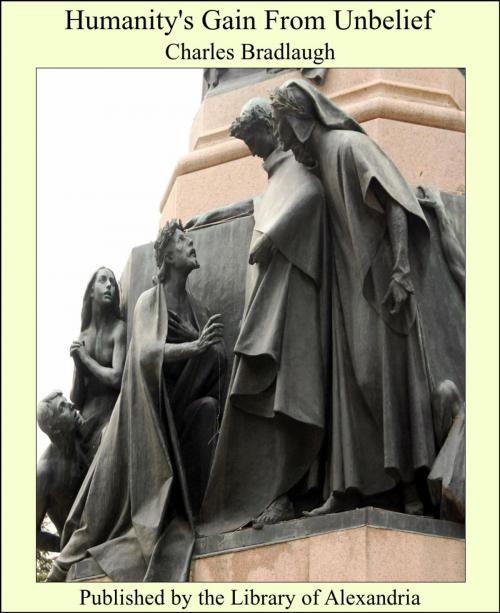Humanity's Gain From Unbelief
Nonfiction, Religion & Spirituality, New Age, History, Fiction & Literature| Author: | Charles Bradlaugh | ISBN: | 9781613103869 |
| Publisher: | Library of Alexandria | Publication: | March 8, 2015 |
| Imprint: | Language: | English |
| Author: | Charles Bradlaugh |
| ISBN: | 9781613103869 |
| Publisher: | Library of Alexandria |
| Publication: | March 8, 2015 |
| Imprint: | |
| Language: | English |
As an unbeliever, I ask leave to plead that humanity has been real gainer from scepticism, and that the gradual and growing rejection of Christianity—like the rejection of the faiths which preceded it—has in fact added, and will add, to man's happiness and well being. I maintain that in physics science is the outcome of scepticism, and that general progress is impossible without scepticism on matters of religion. I mean by religion every form of belief which accepts or asserts the supernatural. I write as a Monist, and use the word "nature" as meaning all phenomena, every phænomenon, all that is necessary for the happening of any and every phænomenon. Every religion is constantly changing, and at any given time is the measure of the civilisation attained by what Guizot described as the juste milieu of those who profess it. Each religion is slowly but certainly modified in its dogma and practice by the gradual development of the peoples amongst whom it is professed. Each discovery destroys in whole or part some theretofore cherished belief. No religion is suddenly rejected by any people; it is rather gradually out-grown. None see a religion die; dead religions are like dead languages and obsolete customs; the decay is long and—like the glacier march—is only perceptible to the careful watcher by comparisons extending over long periods. A superseded religion may often be traced in the festivals, ceremonies, and dogmas of the religion which has replaced it. Traces of obsolete religions may often be found in popular customs, in old wives' stories, and in children's tales.
As an unbeliever, I ask leave to plead that humanity has been real gainer from scepticism, and that the gradual and growing rejection of Christianity—like the rejection of the faiths which preceded it—has in fact added, and will add, to man's happiness and well being. I maintain that in physics science is the outcome of scepticism, and that general progress is impossible without scepticism on matters of religion. I mean by religion every form of belief which accepts or asserts the supernatural. I write as a Monist, and use the word "nature" as meaning all phenomena, every phænomenon, all that is necessary for the happening of any and every phænomenon. Every religion is constantly changing, and at any given time is the measure of the civilisation attained by what Guizot described as the juste milieu of those who profess it. Each religion is slowly but certainly modified in its dogma and practice by the gradual development of the peoples amongst whom it is professed. Each discovery destroys in whole or part some theretofore cherished belief. No religion is suddenly rejected by any people; it is rather gradually out-grown. None see a religion die; dead religions are like dead languages and obsolete customs; the decay is long and—like the glacier march—is only perceptible to the careful watcher by comparisons extending over long periods. A superseded religion may often be traced in the festivals, ceremonies, and dogmas of the religion which has replaced it. Traces of obsolete religions may often be found in popular customs, in old wives' stories, and in children's tales.















